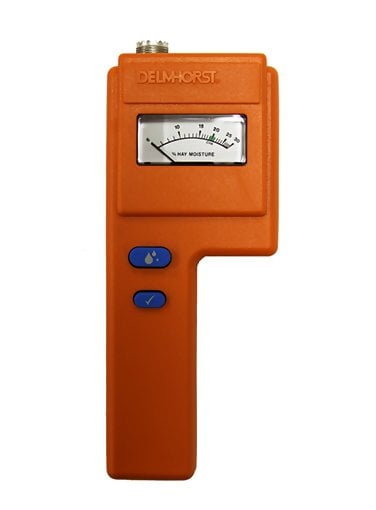
Easy-to-read analog display.
Moisture Range: 6%-30% on hay.
Also available with 13%-40% MC range as F-6.
With simplified controls, the Delmhorst F-6/6-30 Analog Moisture Meter for Hay is a great entry-level meter for value-minded hay producers. The Delmhorst F-6/6-30 moisture meter is also a favorite among those serving the export markets that require lower MC range readings.

Kit Contents

Delmhorst F-6/6-30 Analog Moisture Meter for Hay- Delmhorst F-6/6-30 Analog Moisture Meter for Hay
| | 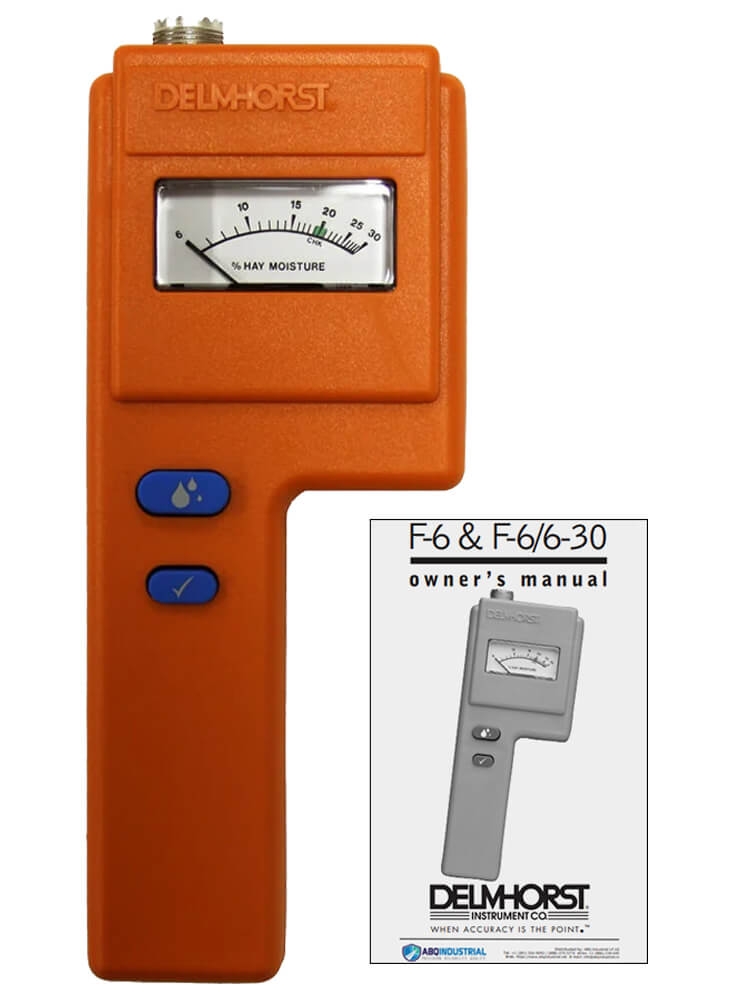 |

Delmhorst F-6/6-30/1235 Analog Moisture Meter for Hay, 10-inch Value Package- Delmhorst F-6/6-30 Analog Moisture Meter for Hay
- 1235 10 Probe for testing standard bales
| | 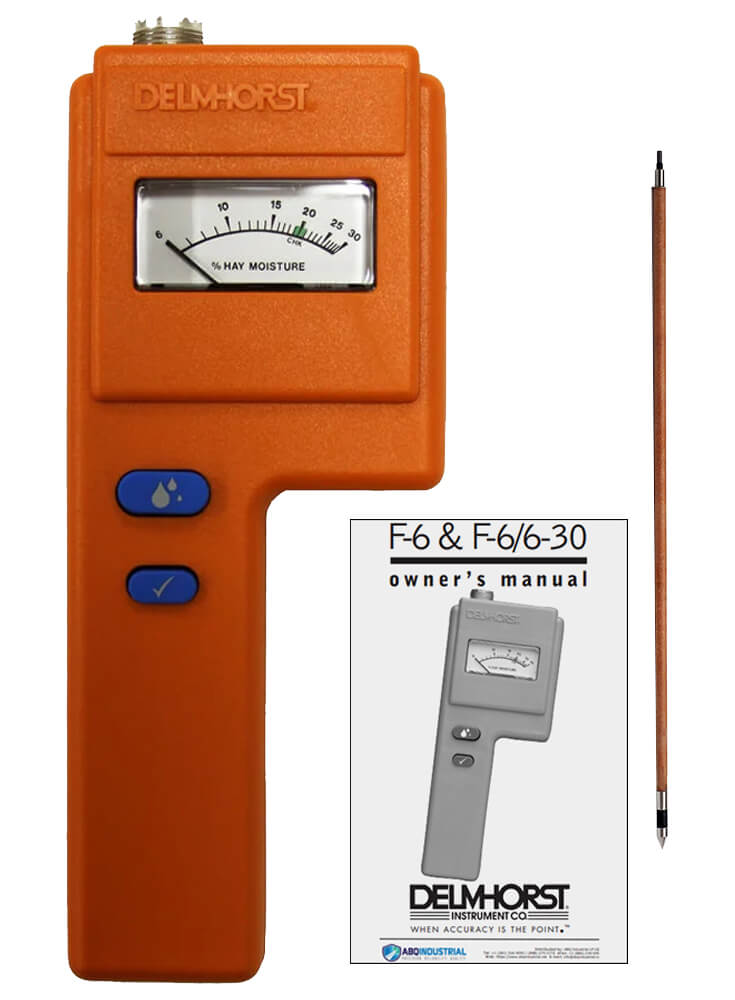 |

Delmhorst F-6/6-30/1235/18 Analog Moisture Meter for Hay, 18-inch Value Package- Delmhorst F-6/6-30 Analog Moisture Meter for Hay
- 1235 18 Probe for testing
| |  |

Delmhorst F-6/6-30/PKG Analog Moisture Meter for Hay, Deluxe 10-inch Package- Delmhorst F-6/6-30 Analog Moisture Meter for Hay
- H-4 Handle - Electrode handle
- 830-2 10 Probe - for testing standard and high density bales
| - 831 Windrow Probe
- Carrying Case
- Instructions
| 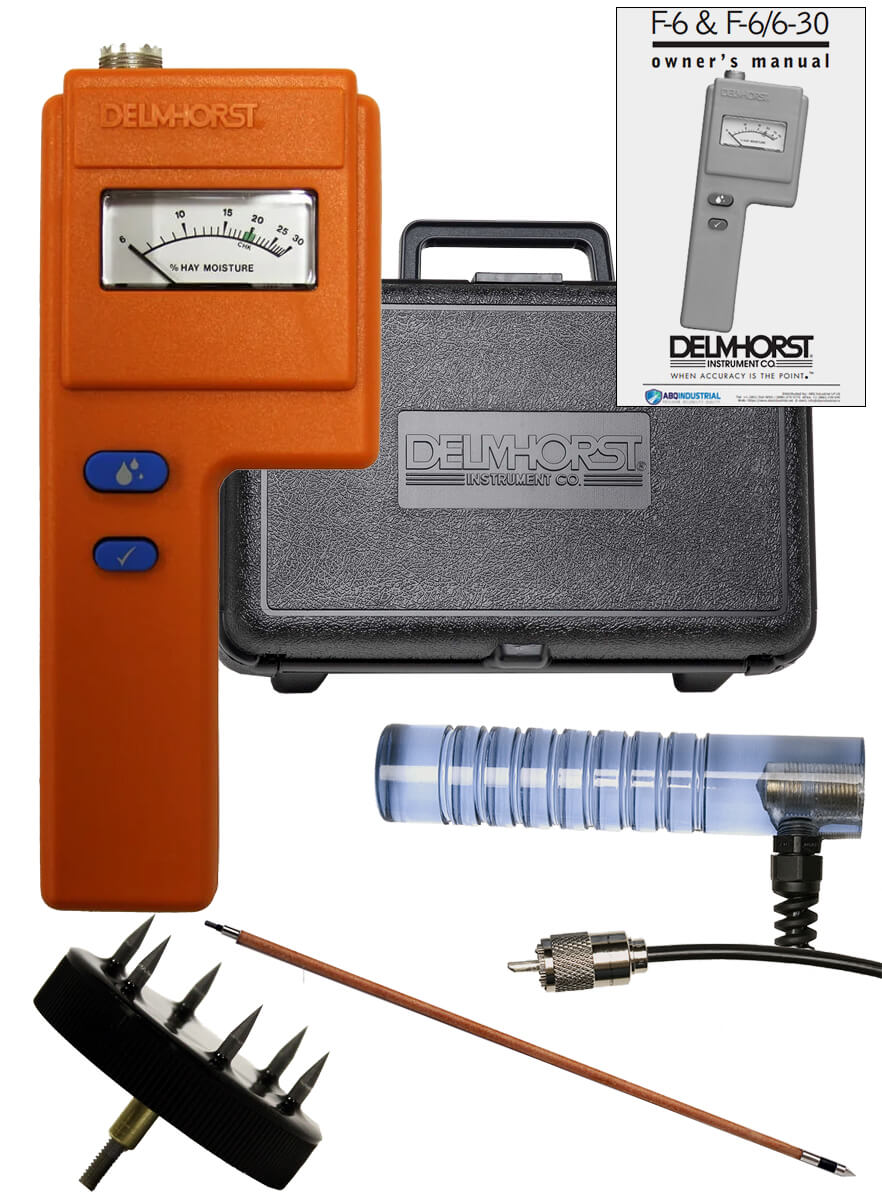 |

Delmhorst F-6/6-30/18/PKG Analog Moisture Meter for Hay, Deluxe 18-inch Package- Delmhorst F-6/6-30 Analog Moisture Meter for Hay
- H-4 Handle - Electrode handle
- 830-3 18 Probe - for testing standard and high density bales
| - 831 Short Pin Prod
- Carrying Case
- Instructions
| 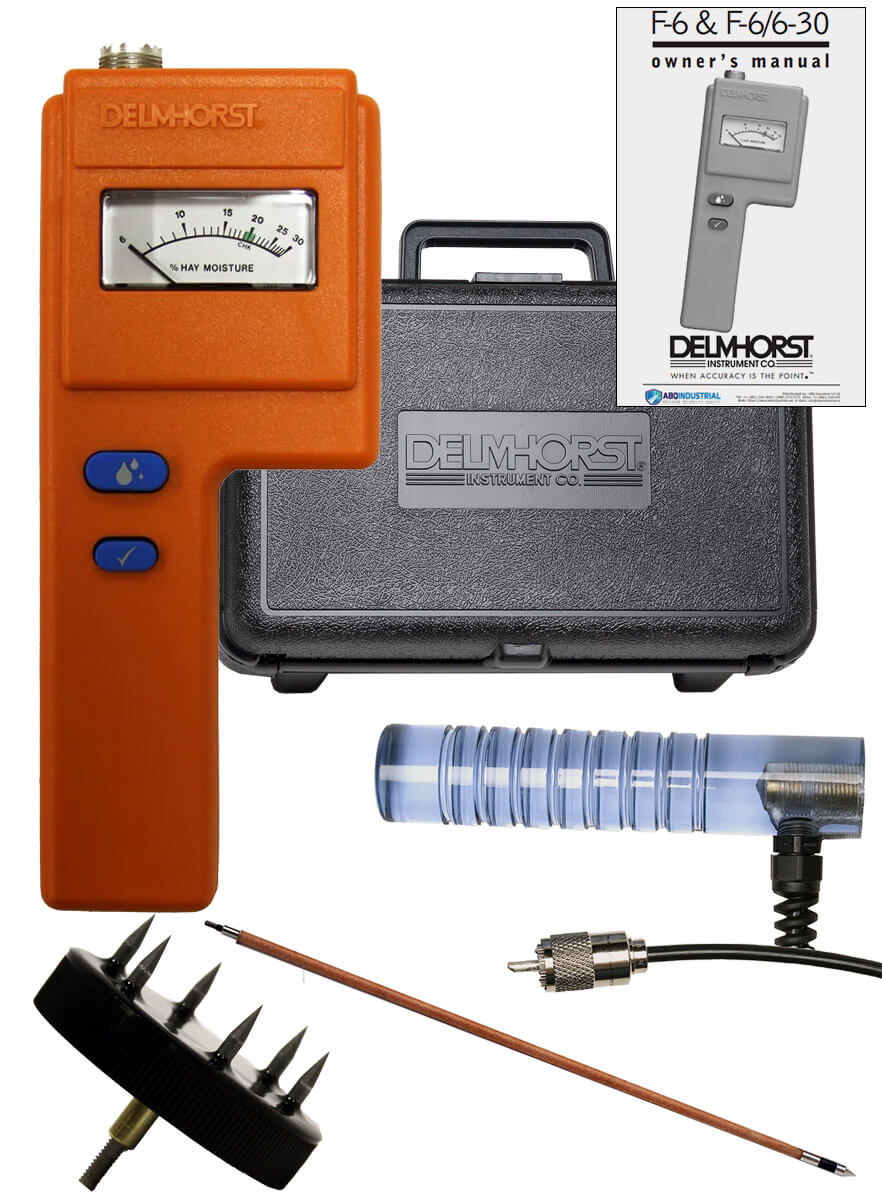 |

Features

- Easy-to-read analog display.
- Moisture Range: 6%-30% on hay.
- Also available with 13%-40% MC range as F-6.
- Built-in calibration check.
- Size: 8 x 3 x 1 5/8.
- Weight: 10 oz.
- Rugged construction ensures years of reliable use.
- Optional sturdy plastic carrying case.
- 9V battery.
- 1-year warranty

Accessories

324CAS-0065 Carrying Case - This carrying case may be purchased as a part of one of our deluxe moisture meter packages, and fits all prods except the 1986 bale sensor, 830-3 prod, and 830-4 prod. Can also be purchased separately.
| 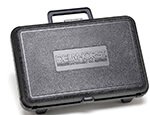 |

MCS-4 - This moisture content standard is great for verifying that your F-series hay moisture meter is in calibration. With two electrical resistance values (16% and 22%) to test your meter against, you can be sure that your readings will stand up to the strictest standards of accuracy. The MCS-4 is also available with a letter of certification traceable to NIST
|  |

Eletrodes

Delmhorst offers a wide assortment of electrodes known throughout the industry for their durability. All Delmhorst electrodes fit any Delmhorst moisture meter. Below are electrodes that are typically used for this model:
1235 - 10 prod used for testing standard bales. Attaches directly to the connector on top of the meter. Also available in 18 length as 1235/18.
|  |

| 830 Series Prods for testing standard and high density bales (requires H-4 Handle). Available as: - 830-2 10 prod
- 830-3 18 prod
- 830-4 36 prod
- 830-5 12 for hops
| 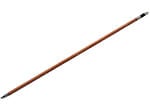 |

| 831 Short Pin Prod |  |

H-4 Handle Electrode handle that attaches to the built-in connector on the top of any moisture meter. Can be used with the 830 series prods, 831 short pin disc shaped prod, and 832 long pin disc shaped prod. This is useful for large or high density bales of hay or scrap paper. Two handed operation is recommended over using a prod that connects directly to the top of the meter (like our 1235 series) to minimize stress placed on the metercasing.
|  |

Downloads

 F.A.Q.
F.A.Q.
Why should i use a Moisture Tester
Moisture content is one of the most important variables and challenges the high quality hay producer must face. Baling at proper Moisture levels is critical to the hay growers objective to bale and store hay in a manner to reduce mold development and at the same time preserve leaves, color, and feed value. Using a Moisture Tester is the only way a farmer can be sure that his hay is being baled at the ideal Moisture levels.
How does a Moisture Meter operate
Most probe-type meters operate on the principle of electrical resistance, utilizing the relationship between the Moisture content of the material and its conductivity. This relation is possible because Moisture is an effective conductor of electricity and hay acts as an effective insulator. The "reading" is made between the two metal contacts at the tip of the probe.
At what Moisture range can hay be baled
Traditionally, the recommended Moisture content for baling hay without a preservative is between 18-20%.
If using a preservative, follow the instructions set forth by each particular preservative manufacturer. Smart use of a Moisture Tester in combination with preservatives and drying agents allows hay to be baled at higher than traditionally recommended Moisture levels.
In either case, do not attempt to bale hay before it is at an acceptable Moisture level, even when using a preservative.
What methods are commonly used for testing hay Moisture
In The Windrow
- Collect hay from the windrow and place it in a five or ten gallon container. Apply a multi-pin prod to the hay and press down on the handle. Take a reading. Mix the hay and repeat this procedure no less than three times.
Then from the same area of the windrow, select up to five large, slower-drying stems and place one at a time across two adjacent points on the multi-pin prod and take readings. The average of these stem readings should be about two to five points higher than actual Moisture content. - Repeat these steps in different parts of the field and pay special attention to the areas where the hay is heaviest. Your decision to start baling should consider the amount of variation found among windrow readings as well as the average stem Moisture.
In The Bale
- Since the interior of most bales is seldom uniform with regard to density and leaf/stem ratio, and it is impossible to obtain a truly "representative" sample, it is important to take a number of readings from various parts of a bale and average them. Pay close attention to the range of readings and the high readings. Drive the prod across the bale slices to obtain firmer, more uniform contact.
Random spoilage of baled hay can occur due to fluctuating field conditions, i.e. windrow size, soil Moisture, stand density, low spots, and shade. Therefore, it is imperative to check bales at several locations in the field.
In The Bale Chamber
- The hay producer can install a micro-controller based Moisture Meter in the tractor cab and connect it to a sensor in the bale chamber to monitor Moisture while baling, without leaving the cab.
- The microcomputer collects and processes eight readings that are accumulated every four seconds. The meter then displays the average and highest reading. This cycle is repeated every four seconds.
A microprocessor-based continuous monitor is an easy and reliable way to give the operator clear guidelines and a little less to worry about. Even though this method provides reliable information, we recommend that you take readings in several bales, especially at the beginning of baling, and as you see conditions change. The FX-2000 can be used for on-the-go Moisture monitoring or as a portable meter.
What affects the meter readings
Besides Moisture content, factors which affect meter readings most are: Moisture distribution, crop variety, temperature of the hay, crop maturity, sample density, cutting, and the overall climatic conditions present. Cloud cover and high relative humidity result in more variable Moisture readings than a sunny, dry day with light breezes.
How can i know i'm receiving the most accurate results
Because field conditions can change rapidly, accuracy guidelines must be considered in terms of "ranges", not specific points. Claims of accuracy should be taken with caution, because it is unlikely that such claims can be consistent. Expert evaluations of the same meter may yield different results, mainly dependent on the technicians sampling procedure, conditioning and uniformity of the samples, difference in crop, and differences in oven test procedure. For optimum results, carefully read the owners manual provided with each meter.
Is there a way to make sure my meter is in calibration
The primary or electrical calibration of the tester can easily be checked by the built-in calibration checkpoint feature or by using an optional Moisture content standard.
How do I keep a Delmhorst meter in good working condition
Delmhorst Moisture Meters are well known for their ruggedness and ability to withstand years of rough handling. Like any testing instrument, a little care goes a long way toward trouble-free service:
- Store the meter in clean, dry place
- Change batteries and pins as needed
- Keep the meter and electrode clean by using any biodegradable cleanser sparingly on external parts only.